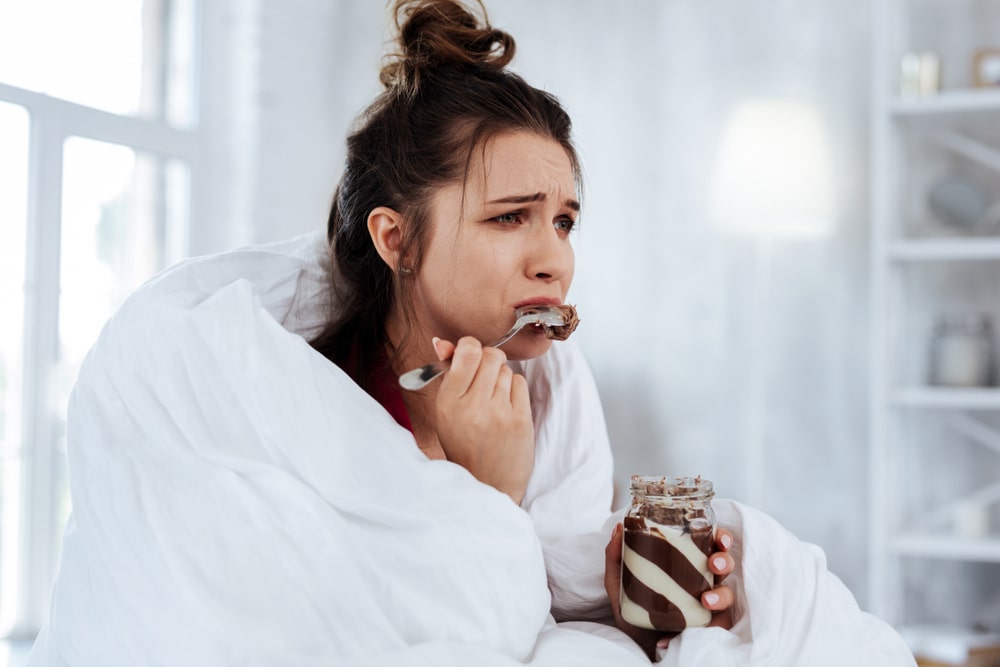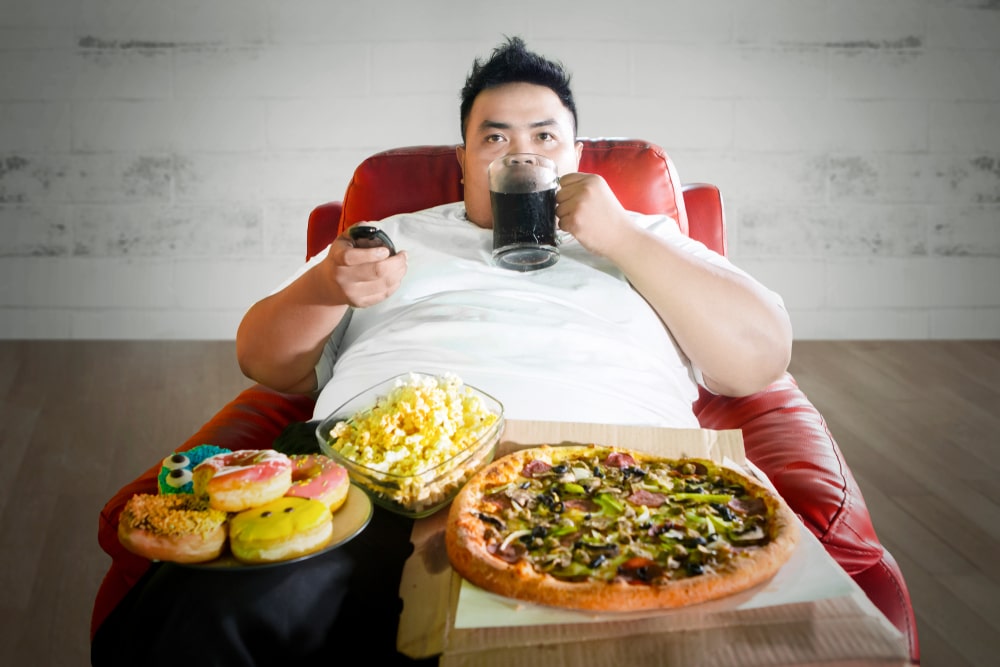Food is essential for overall well-being and is the focus of so many things people do in their lives. It can be a part of celebrations or times of sorrow, in a way to show care. Sharing food with others helps people connect to others and be socially active. This points out the fact that there is a natural link between emotions and food.
In this article, our experts throw light on emotional eating including its causes, symptoms, and ill-effects. They even suggest some tips on how to stop emotional eating.
Many people do not eat to satisfy their physical hunger. They may eat food for comfort, to get relief from big, difficult feelings, or to reward themselves for their success. And, when they do eat, they often pick on junk and processed food items, sugar-loaded foods, and drinks, or fatty foods that are all comforting but at the same time unhealthy. All this comes under emotional eating.
What is emotional eating?

Emotional eating refers to having food to cater to emotional needs- meaning to feel better, instead of filling the stomach. Everyone does it at some point in their lives. When one does emotional eating, one feels at that moment that it is a way of coping with stress, boredom, anxiety, sadness, loneliness, or tiredness/fatigue. Unfortunately, eating does not fix such feelings.
Emotional eating can be difficult but it is not a solution to any hardship or tough things in one’s life. It only offers temporary relief. But later, one would only feel guilty because of their emotional eating or overeating. Also, the original emotional problem remains the same with no solution. If done for the long term it can worsen emotional well-being.
If you find yourself emotionally eating and want to learn how to stop emotional eating. This article will provide you with the best tips on ways to stop emotional eating and get back to normal. Read on for more detailed insights on how to stop emotional eating.
What causes people to eat out of their emotions?

Some of the common external causes of emotional eating may include:
- Stressful lifestyle.
- Financial worries.
- Other health issues.
- Relationships with conflicts or struggles.
Other possible internal causative factors of emotional eating are:
- Lack of realization of how you feel (introspective awareness).
- Poor understanding, processing, or describing of emotions- a condition called Alexithymia.
- Inability to manage or control emotions- an emotional dysregulation.
- Under-active response of cortisol hormones to stress- reversed hypothalamic pituitary adrenal (HPA) stress axis.
Emotional eating is usually an automatic behavior. When an emotional eater eats more food to cope, the habit prevails. If you wish to put an end to this habit, switch to this section “How to stop emotional eating?”
Emotional Eating Symptoms:

Not able to decide if you would need tips on how to stop emotional eating? Here are some of the clues that you should watch for to confirm you are an emotional eater and not eating to satisfy your physical hunger.
- Powerful emotions cause a sudden urge to and that feeling to eat be overwhelming.
- Craving for specific comfort foods such as junk food, sugary snacks, or processed foods.
- Mindless eating: eating a lot without being aware of the amount of intake.
- Hunger is not satisfied even if the stomach is full, often leading to overeating.
- Hunger is not felt as a growling stomach or a belly pang instead it shows up as a craving to eat that just can’t get out of the head.
- While eating, attention is paid by the eater to the specific texture, smell, and taste of food.
- Eating food calms or rewards when high or light on emotions.
- After eating, guilt, regret, or shame bothers the eater- that’s because deep within one knows that one is not eating for nutritional reasons.
If you are experiencing any of the above-mentioned symptoms of emotional eating, you must quickly go ahead with the tips on how to stop emotional eating, detailed further.
Why is emotional eating harmful?

Emotional eating has many consequences, including:
- A sense of guilt or remorse.
- Low self-esteem.
- Nausea due to eating too much.
- Can hinder the weight loss efforts.
- Cause fatigue.
- Increased blood pressure.
- Cause weight-related health issues.
- Overeating can cause pain in the stomach and even nausea.
- Can result in low self-esteem as a sense of guilt due to overeating.
- Weight gain and associated health issues such as diabetes, obesity, hypertension, and fatigue (only when emotional eating occurs for a long time).
To avoid such ill effects of emotional eating, it is important to stop it at your earliest. Scroll down to the next section “How to Stop Emotional Eating” and practice the mentioned tips to prevent harm caused by emotional eating.
How to stop emotional eating?

Finally, you have come to the main section of this article: “How to Stop Emotional Eating”! If you are struggling with emotional eating.
Here are some coping ways that you can practice right away:
- One needs to identify the triggers that are causing emotional eating triggers. This may include stress, feelings of emptiness in life, poor social influences, poor social life, childhood trauma or habits, or stuffing emotions due to pressure or overthinking.
- Always keep an emotional status track diary and keep track of your food options. This will help one to learn more about their emotional eating pattern.
- Look for alternatives to cope with your specific feelings.
- Try to cultivate other interests and learn to enjoy life which also helps increase self-confidence.
- Pause and reflect when an urge to eat hits to allow yourself to change your decision to eat.
- Try to create a supporting network and surround yourself with those supporting efforts that encourage change.
- Learn to accept the highs and lows you feel anytime.
- Practice mindful eating.
- Rely on other senses, instead of taste, to cope with emotions.
- Eat the food slowly and try to savor your food.
- Get committed to following healthy lifestyle habits- get proper sleep, regularly exercise, manage stress, and connect with others.
- Think about your future and try to bring positive change.
- Try to walk outside home and enjoy the beauty of nature which is a great distraction from emotional eating.
- Plan healthy meals.
- Make comfort foods healthier.
- Seek help from experts.
FAQs:
Is emotional eating an eating disorder?
Emotional eating itself is not an eating disorder. It can indicate disordered eating which may in the future develop into an eating disorder. Disordered eating may refer to irregular meal timing, being very rigid with food choices, often eating in response to emotions even if not physically hungry, frequent dieting or food restrictions, labeling food as good or bad based on personal choices, obsessive thoughts about food, or having guilt on eating unhealthy food. The doctor can best guide one on how to stop emotional eating and ways to prevent it.
How does eating healthy affect you emotionally?
Eating healthy can help one maintain a healthy body weight and avoid or minimize many physical and mental health issues. Many research studies worldwide reveal that there is a connection between diet and mood or sense of well-being. A person having an unprocessed, nutritious diet tends to have good mental health. There is strong evidence that having healthy foods like fresh fruits and vegetables, whole grains, and fish may reduce one’s risk of depression and boost one’s mood.
Does not eating make you emotional?
Yes. Dieting or not eating enough can impact the brain functioning. Your body needs to be well-fuelled with healthy food to prevent your brain from flicking into survival mode. When your brain is switched to survival mode, parts of your brain responsible for intellect, consciousness, or logical reasoning may shut down. Your mood would be badly affected. Dieters or under-eaters generally feel low, depressed, and easily enraged or irritated. They may experience panic attacks or start having obsessive and compulsive behavior.
How do eating disorders affect health and emotions?
Eating disorders can impact physical and mental health. In the context of mental health, eating disorders often result in depression, stress, anxiety, and even substance use disorder. Physical effects of eating disorders include feeling cold, slow, or sluggish; heart problems, hypotension, and congestive heart failure; hormonal problems such as weak bones, hypothyroidism, IBS, and stomach blockages. These emotional eating disorders can affect the most important body organ, the brain, and often cause problems like lack of concentration, seizures, nausea, and trouble sleeping.
How to lose weight when you are an emotional eater?
Emotional eaters often tend to eat too much, especially foods and drinks loaded with calories, sweets, and unhealthy fats. Thus, they put on weight easily. Luckily, they can lose their body weight by regaining control of their eating habits, taking steps to control their food cravings, and returning to their weight loss goals. If you are an emotional eater desiring weight loss, you must know the tips on how to stop emotional eating and practice the same.
References:
- https://www.healthline.com/health/emotional-eating#causes
- https://www.health.harvard.edu/diet-and-weight-loss/struggling-with-emotional-eating
- https://www.helpguide.org/articles/diets/emotional-eating.htm


